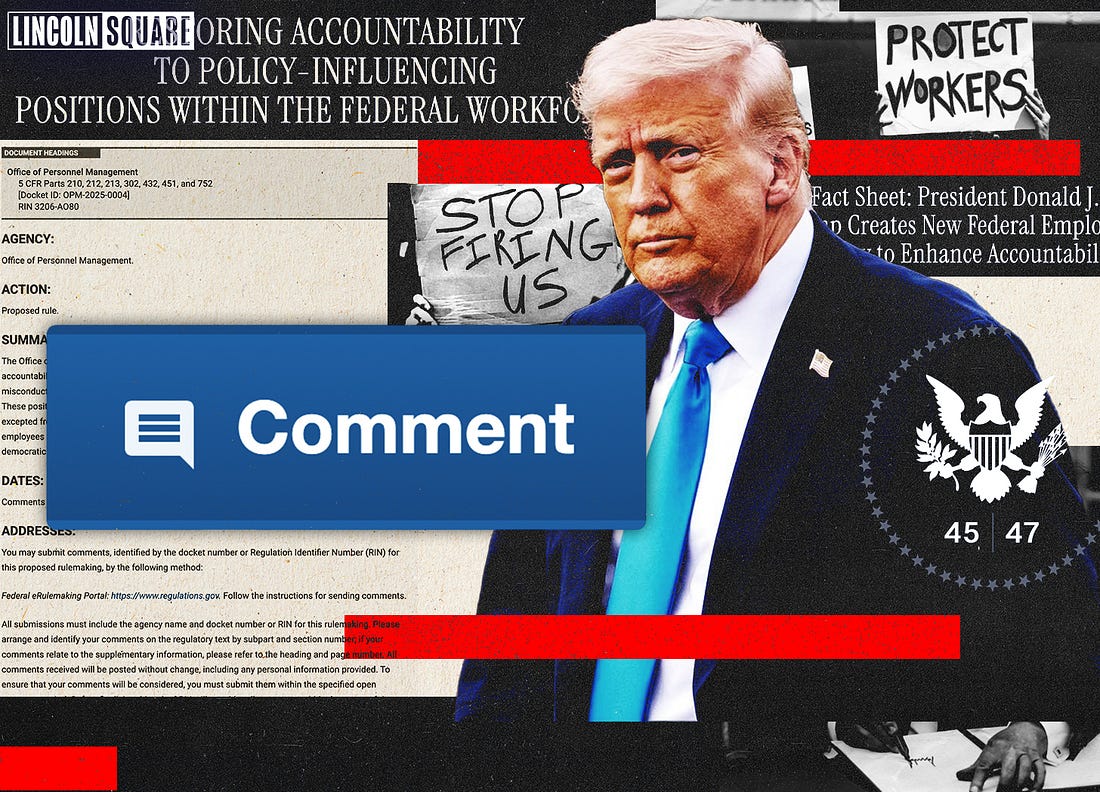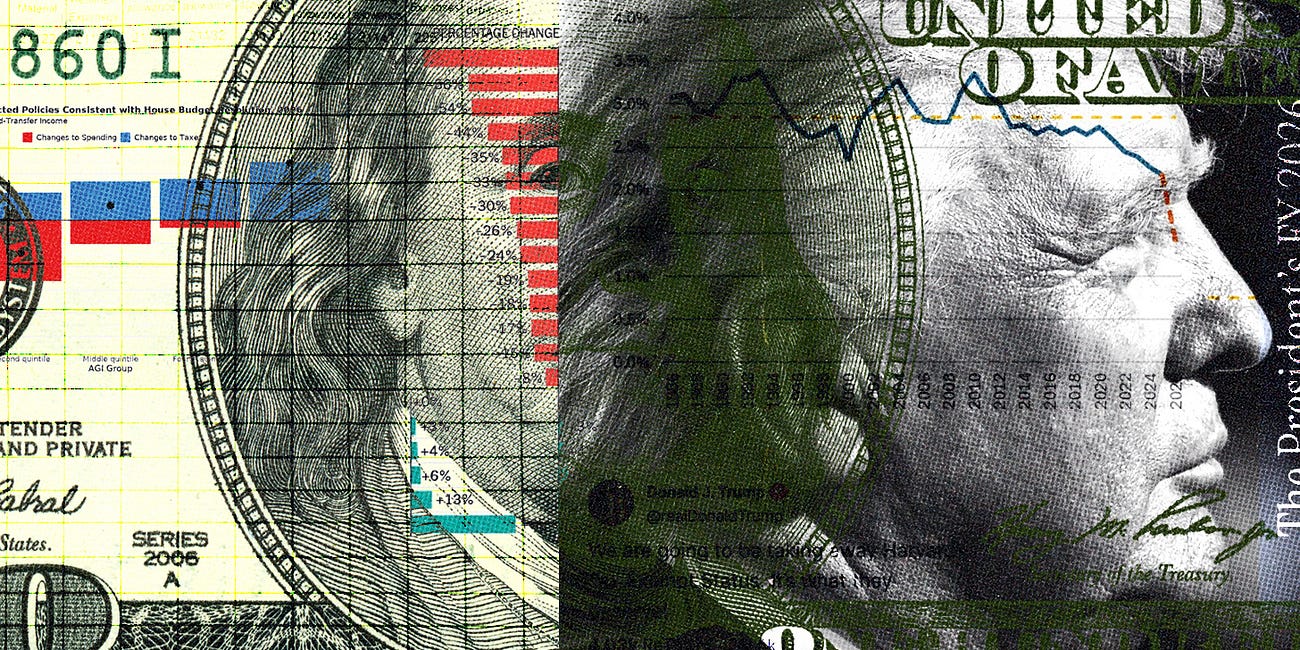|
 |
If you’re able, consider financially supporting our work by becoming a paid subscriber.
Here is a specific thing you can do to fight Trump's politicization of public services
Feeling overwhelmed? That's OK. Here's your guide to fighting back against Trump's war on federal workers and basic competence.
Trump’s maximalist strategy of firing off one executive action after another seeks to overwhelm us. Finding some tangible way to respond sometimes feels impossible. So, here is something that you can do:
Take the time you would have spent complaining about politics online, and use it to write a comment opposing the proposed Office of Personnel Management rule to politicize public services. You can do it in 5 minutes. Deadline is May 23rd!
Why should you do this?
The proposed rule seeks to reinstate Schedule F, Trump’s never implemented plan to institutionalize political control and loyalty tests for the career bureaucracy by turning 50,000 or more career civil servants into political appointees.
Federal comments really do matter. By law, they must be read by the administration, and substantive comments require a response. Failure to do so can see the rule tossed out by courts.
It’s easy: Enter a comment here. No log in. Just click on the “submit a public comment” button. You can enter text, or upload a document.
The volume of opposing comments matters, so writing something short and sweet is great. You don’t need to read the rule in depth or be an expert. The proposed rule is bad and protecting nonpartisan civil servants is good. See more details below or take a look at the comments people have already posted.
More detailed and informed comments are even better. One thing that is different from the first time Schedule F was introduced is that we now have a track record showing how Trump’s much more politicized mismanagement of the federal government is having negative effects, and handing him more power would be a disaster. I am especially appealing to people with deep knowledge of policies and management to explain how Schedule F would hurt their domain of expertise. Please, please, please weigh in to provide actual information about how providing protections for career officials will protect against political abuses. If a bunch of people with real and credible experience comment, it becomes harder for the administration and judges to ignore us. I will leave comments to this piece open, so people can share their comments if they wish.
If there is someone you know who you think would be great to write a comment, take a moment to share this post with them.
Here are some resources to help:
My previous comment on Schedule F when Biden put a rule in place to block it (mostly still relevant!)
Politicizing Social Security Administration Will Further Undermine Benefits
I will draft my own comment soon. In the meantime, here is what Pam Herd and I wrote in Science about how politicization affects scientific agencies in particular. It includes a brief explainer about Schedule F and evidence that it is a bad idea.
The opening months of the Trump administration represent a historic disruption to America’s scientific agencies. Staff have been fired or reassigned in the name of efficiency, resulting in chaos. Grants have been canceled mid-project for featuring the wrong words. “Pauses” and “reviews” are designed to block spending, in the hope that Congress will make the current impoundment of funds a baseline for permanent disinvestment. While the scientific community waits to see what the new normal will be, the Trump administration has a plan to institutionalize a much more politicized structure of control over government broadly, including both public scientific investments and the use of scientific knowledge in policy actions.
“Schedule F” (now renamed Schedule Policy/Career) is shorthand for an executive order that is a sharp break with civil service merit principles, which assume that career employees should be retained on the basis of performance and protected against political coercion. The US is already unusual in the degree to which it reserves the top layers of organizational leadership for short-term political appointees. Schedule F will vastly expand the number of appointees, adding a proposed 50,000 from the current 4000. It does so by involuntarily reclassifying career civil servants as appointees, removing job protections, the basic constraint against political interference.
The administration says that the purpose of Schedule F is to increase accountability for civil servants involved in policy-making. Set aside the fact that civil servants are accountable in multiple ways, Trump’s own justifications strike a more conspiratorial tone, including “the deep state can and must be brought to heel.” But what better way to actually institutionalize a deep state than by expanding political influence over what constitutes good science?
Studies show that politicization of public services generally worsens public-sector outcomes. Public employees invest less in developing their expertise and become more likely to exit. Instability and lack of experience reduce organizational performance. Politicization increases the influence of more ideologically radical appointees relative to more moderate civil servants. Politicization also reduces accountability. Bureaucrats worried about being fired fail to share uncongenial information with their political bosses and become less likely to respond to congressional oversight. As politicization begets lower transparency and administrative capacity, it increases waste and inefficiency.
What might this mean for scientific agencies? Agencies like the National Science Foundation (NSF) and the National Institutes for Health (NIH) cannot meet their statutorily mandated scientific missions if politics, rather than scientific expertise, drive decision-making. Federally supported science has been so successful, in no small part, because agency staff are typically expert scientists beholden to ensuring that the agencies deliver world-class science. Now, many could be turned into political appointees. The proposed policy defines grantmaking positions as “policy-making,” which includes “drafting of funding opportunity announcements, evaluation of grant applications, or recommending or selecting grant recipients.” This definition, which neatly matches agencies’ own definitions for certain career staff, would include most NIH program officers and NSF program directors.
The past few months at NIH and NSF preview how politicized scientific agencies would operate. Funding choices that reflected the consensus of some of the best scientists in the world were reversed by nonscientists. Program officers have, at points, been told not to communicate with the scientific community or have had their engagement limited. Scientific agencies have been directed to effectively reduce the flow of funds to a trickle by adding new layers of redundant review and red tape and even violating court orders to reinstate cancelled grants.
Other agencies, including regulatory agencies, apply rather than fund basic science, but the risks of politicization are no less. How confident can Americans be that federal employees will not have to choose between their job and scientific values in areas such as climate change, food safety, extreme weather forecasting, or public health?
Career officials in scientific agencies are unwilling hostages in Trump’s politicization of science, wondering if they will lose their jobs for trying to defend the congressionally mandated missions of their organizations. Although the current era of layoffs will hopefully soon be over, the purpose of Schedule F is to permanently instill the degree of political control over science fueling the sense of fear that pervades those agencies now.
Vannevar Bush’s 1945 blueprint for America’s scientific infrastructure emphasized the centrality of protecting scientific organizations from politicization. That vision has been extraordinarily successful. Schedule F assumes the opposite: It treats scientific independence as a threat to be minimized.
This is a guest post from Don Moynihan, author of the Can We Still Govern? Substack. Read the original article here.
You’re currently a free subscriber to Lincoln Square Media. For full access to our content, team, and the community, upgrade your subscription.


